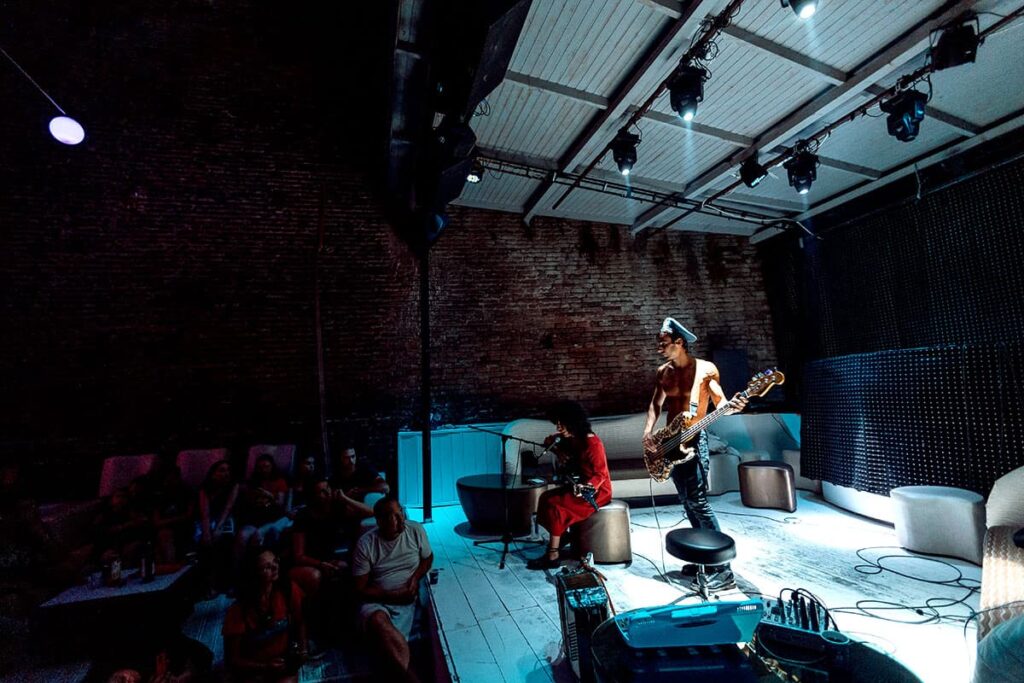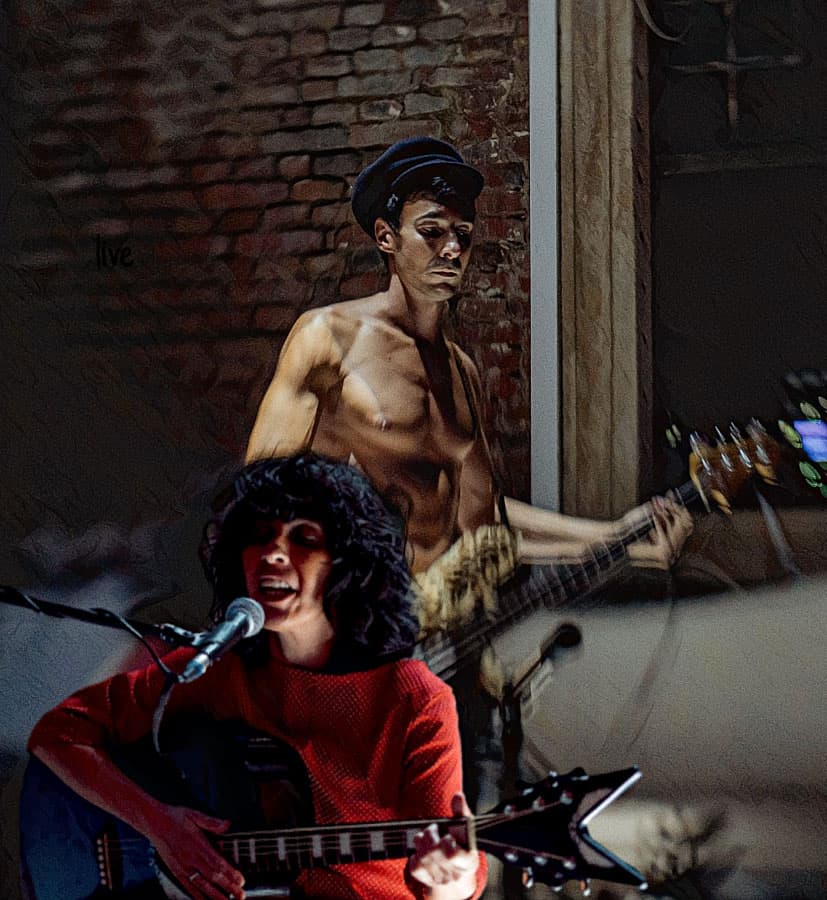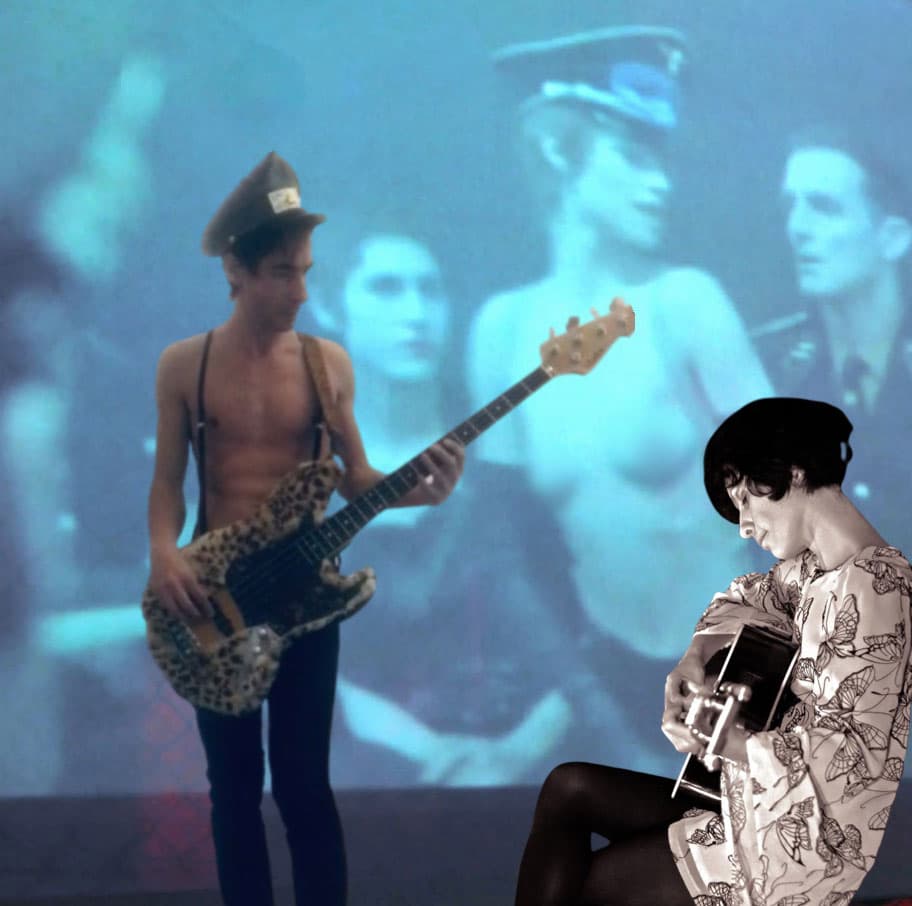
Roma Amor is a group from Ravenna that has been exploring its sound for years, called “dekadencki folk cabaret”. You can hear great passion and emotional involvement in their work. Each of Roma Amor’s albums brings a kind of concept and tells about a specific thing, it is a story recorded in the form of sounds. At the end of 2022, the label Old Europa Cafe released their album “La Maga Femmina”. In my opinion, the album is the most gloomy and dark, but full of feelings and sometimes anxiety.
Michał Majcher
Michał Majcher: Your first album was released in 2008. Since then, you have released several albums and played many concerts. I think Roma Amor’s music changes and evolves. How do you see your development?
Roma Amor: Difficult to say. At the moment we are focused on the promotion of “La Maga Femmina”. We think it is a unique and original work in its genre: a dark folk album with esoteric lyrics in dialect taken from the local tradition of witches, spells, rituals, female magic. We are still focused on this folk horror journey, that’s our current mood.

MM: How is Roma Amor’s line-up now?
RA: The duo Euski-Candela is always the kernel of the project, the one that has always been the crucial point of what we wanted to express. The fact that we recently have cooperated with the guitarist and mandolinist Roberto Zabberoni is because it was him that started appearing in a few tracks of the 2009 album “Femmina” and he seemed to us the right one who could get into our new album. Nevertheless, we are simultaneously carrying on as a duo, sometimes with different line-ups according to the situation and what is better for the songs we want to display.
MM: At the end of 2022, your, next album “La Maga Femmina” was released, an album with a specific concept and content.
RA: In this our last work there is a full immersion in the folk tradition of our area, Romagna (Italy): far from being the notorious “Riviera” popular with tourists and full of sun, beaches and dance, we unveil its dark side, with the lyrics taken from our folklore, sung in dialect with an archaic taste and witchy tones, with gloomy arrangements of dismal stories told by remote women who lived in a place where nature is the queen, also with its most unpleasant side. Like in 2009 “Femmina”, in “La Maga” the main characters are women, real or legendary, with their sombres stories.
MM: In my opinion “La Maga Femmina” is your darkest album. Was that your assumption, or did it just come from the lyrics on the album?
RA: It’s what we felt and wanted in our last compositions: the lyrics were an outcome of what we studied and they suited perfectly with the atmosphere we had in mind. We found that the work we started with “Femmina”, where we wanted to focus on the dark feminine world, was not concluded: we read so many traditional stories of witches, lullabies, rituals, nonsense rhymes, and they couldn’t be ignored.
MM: The new album is like the second part of your album “Femmina”, on which there is a photo from the theatrical performance of sister Euski. Please tell me about this photo because it is a very interesting story.
RA: It’s a photo taken during the pièce “Le ceneri di Lola Montès” (Lola Montès’s ashes) of Euski’s sister’s theatre company Tanti Cosi Progetti, where she plays Lola Montès, a famous and incredibly adventurous dancer who became the main attraction of a circus after being the lover of various important European men. This incredible woman sums up the sense of abandonment, the apogee of defeated vanity, reduced to a circus parody, a fascinating lover of powerful men forced into a circus freak. The rose in her mouth, once adornment in her hair, becomes something mutilating, punishing.

MM: A few years ago I read an interview with you where you said that you don’t need a booking agency, that as an independent band you want to have contact with people who like and appreciate the work of Roma Amor. Is that still the case?
RA: Yes, we are independent and we still like feeling free, without any booking agencies. We like to think that things build up by experience, by meeting new people who like to share our music. Of course we are aware that it is not the easiest and most comfortable thing for a band, but we like it to be that way. When there is the chance to play in a situation we like and we feel we are , we are more than availabe.
MM: Roma Amor is sometimes referred to as a project from the “neofolk” scene. In my opinion, this is a big mistake. Although you use similar instruments, the band’s music differs greatly from typical neofolk sounds.
RA: In fact, we like to introduce our sound as “dekadencki folk cabaret”. The Polish word was given to us by some special friends who organized one of our gigs in Poland, and we are very fond of it. When we play as a duo we might be a bit closer to neofolk because our sound is more a mixture of dark folk and chanson and less linked with traditional folk.
MM: You used to tell me about your main inspirations for example Bowie, Almond, Brel, Aznovour, Morricone, French chanson, old Italian pop from the 60’s. Is there anything in contemporary music that inspires you right now?
RA: Something taken from the dark folk and neo cabaret subculture, black metal and industrial music. Euski is interested in the latest acoustic arrangements of the Italian singer Raiz, because she finds some links to the way he uses his voice and the passion he puts into music.

MM: Another thing I have to ask about are the movies. I know it’s an important piece of art for you. Sometimes your concerts are accompanied by visuals from fragments of films. You also referred to many soundtracks in your cover songs. Will we find references to movies on the last album “La Maga Femmina”?
RA: There aren’t any direct references to movies in “La Maga Femmina”, but the atmosphere can recall some Italian horror cult movies such as “la casa dalle finestre che ridono” by Pupi Avati or “Il demonio” by Brunello Rondi.
MM: I’d also like to ask you about the new wave project Dogs in Space that Michele once co-founded. You reactivated it some time ago. Will it continue?
RA: We are thinking of something in that direction, even if it is still at an embryonic stage. We experimented it in one of our last gigs, in Milan, where Euski shifted to the drums and backing vocals and Michele brought up “the other side of the romantic accordionist”! A couple of tracks performed, that gave us an adrenaline-filled feeling we liked to have.
MM: Finally, quite perversely, are you planning an album inspired by soundtracks from giallo movies?
RA: We don’t know yet, we are surely big fans of that kind of films and we never get tired of it. We are also fond of the 70’s period of “Giallo” and thrillers, which was particularly full of films we really like. According to our music, though, we prefer a kind of folk horror mood rather than “Giallo” soundtracks, where big masterpieces like Morricone film music already exist and have become worldwide. So we like investigating the gothic and pagan roots of our folklore and we think our album “la Maga” is quite unique, as nobody has already done a similar thing with our local dialect and moreover it is strictly linked with our personal interests and studies in folklore and ethnomusicology.